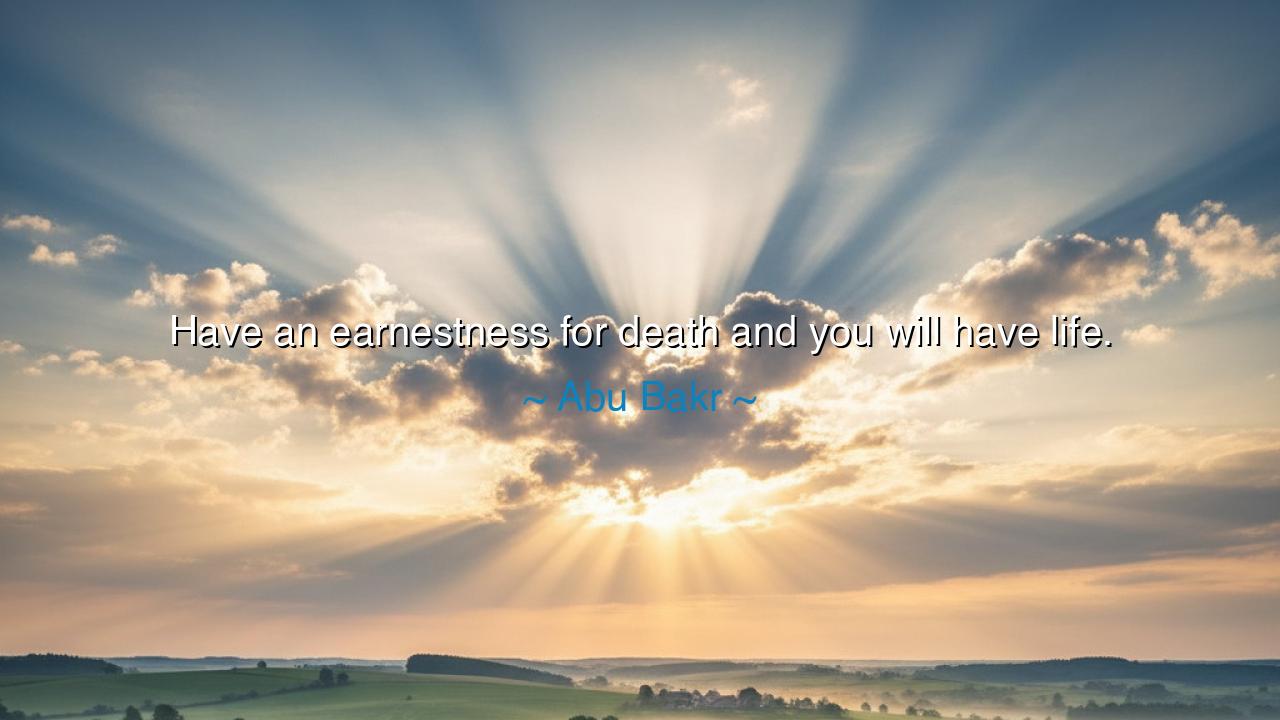
Have an earnestness for death and you will have life.






“Have an earnestness for death and you will have life.” Thus spoke Abu Bakr, the first Caliph after the Prophet Muhammad, a man of unwavering faith and humility whose words carried the weight of eternity. In this simple yet profound saying, he reveals one of the deepest paradoxes of existence: that only those who embrace death truly understand life. To have “earnestness for death” is not to long for the grave, nor to despise the world, but to live with the awareness that life is fleeting — a trust, a journey, a test. When a soul remembers its mortality, it ceases to chase illusions and begins to live with purpose, clarity, and peace.
The origin of this quote lies in the early years of Islam, in a time when life was fragile and faith demanded courage. Abu Bakr had walked beside the Prophet through times of persecution and triumph, and he saw firsthand how those who feared death were enslaved by the world, while those who faced it with earnestness and acceptance became free. For him, the remembrance of death was not a call to despair, but a discipline of the heart — a way to purify the soul from greed, arrogance, and distraction. In the fire of mortality, he believed, the gold of faith is refined.
To “have an earnestness for death” means to live each day with the understanding that every breath is a gift and every act is recorded. It is to walk through the world lightly, without attachment to its false promises. The man who remembers death does not waste his hours in envy, or hatred, or pride, for he knows that all will fade. Instead, he fills his moments with meaning — with kindness, truth, and service. He becomes humble before his Creator and compassionate toward His creation. And in this way, by accepting the end, he discovers the beginning of true life — a life lived consciously, righteously, and courageously.
History offers many examples of this truth. Consider the story of Khalid ibn al-Walid, one of the greatest generals in early Islamic history, known as The Sword of God. He fought in countless battles, fearless and steadfast, for he saw death not as an enemy but as a doorway to the Divine. Yet when he grew old and lay dying in his bed, he wept — not because he feared death, but because he had not died in battle. “I fought in a hundred fights,” he said, “and here I am dying like a camel.” His words reveal the same spirit Abu Bakr spoke of: an earnestness for death, not out of morbid longing, but out of devotion to a life of purpose. To him, death was not the end, but the ultimate meeting with truth.
This wisdom echoes across faiths and philosophies. The Stoics of ancient Greece, too, taught the practice of memento mori — “remember you must die.” They believed that meditating upon death frees the soul from fear and awakens gratitude. The samurai of Japan carried the same teaching in their code of honor: “The way of the warrior is found in death.” For to live as if one were already dead is to live without hesitation, without deceit, without wasting a single heartbeat. In this, all traditions agree: the remembrance of death is the teacher of life.
Yet to misunderstand Abu Bakr’s words is to mistake courage for despair. He did not call men to abandon the world, but to see it with clear eyes. The one who lives as if he will never die becomes arrogant and blind, clutching at wealth and status. But the one who remembers death lives with balance — striving for good in this life, while preparing for the next. Such a person does not waste his life in fear, for he knows that death is not the destroyer of meaning but its completion. To live well is to die well, and to die well is to have lived with awareness, faith, and love.
The lesson, then, is this: live with the end in mind, and every beginning will have purpose. Do not flee from the thought of death; let it sharpen you. Let it strip away what is trivial and reveal what is eternal. Speak your truth while you can. Forgive quickly. Give freely. Pray with sincerity. Build not just for the world that passes, but for the world that remains. To live as though tomorrow were promised is folly; to live as though today were sacred is wisdom.
So remember the words of Abu Bakr: “Have an earnestness for death and you will have life.” Let them be a lantern in the dark corridors of time. For the one who walks with death at his side does not stumble — he moves with grace, for he knows where the path ends. And when that end comes, it will not meet him as a stranger, but as an old friend — the messenger that carries him from the fleeting dust of this world to the eternal light beyond.






AAdministratorAdministrator
Welcome, honored guests. Please leave a comment, we will respond soon